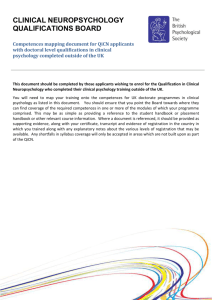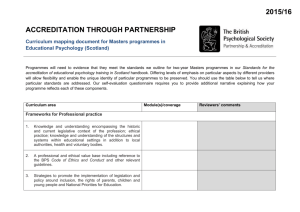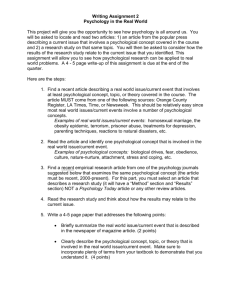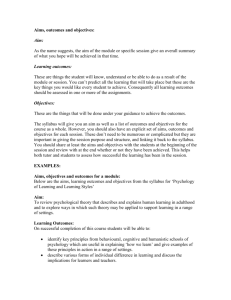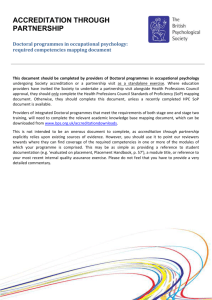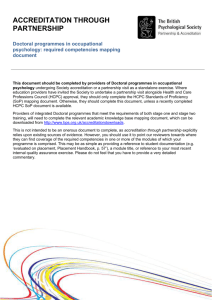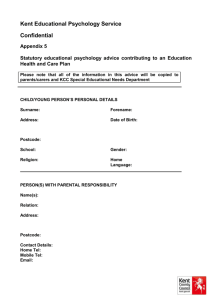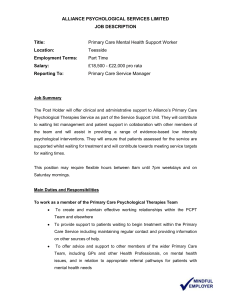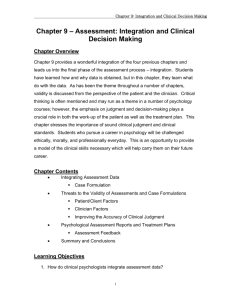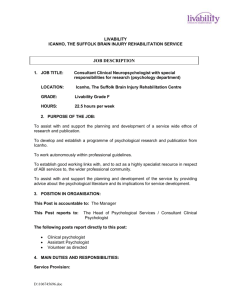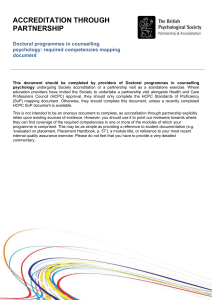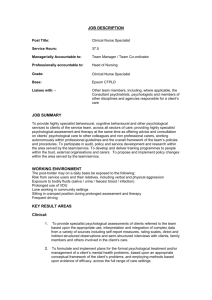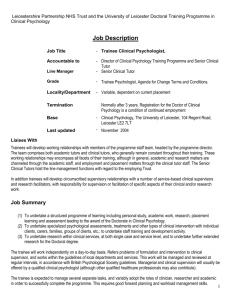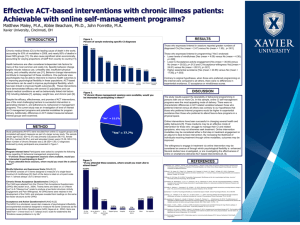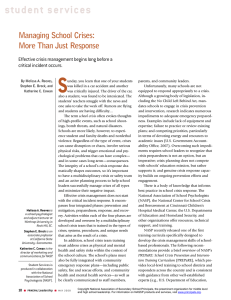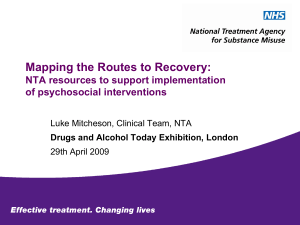Required competencies - British Psychological Society
advertisement
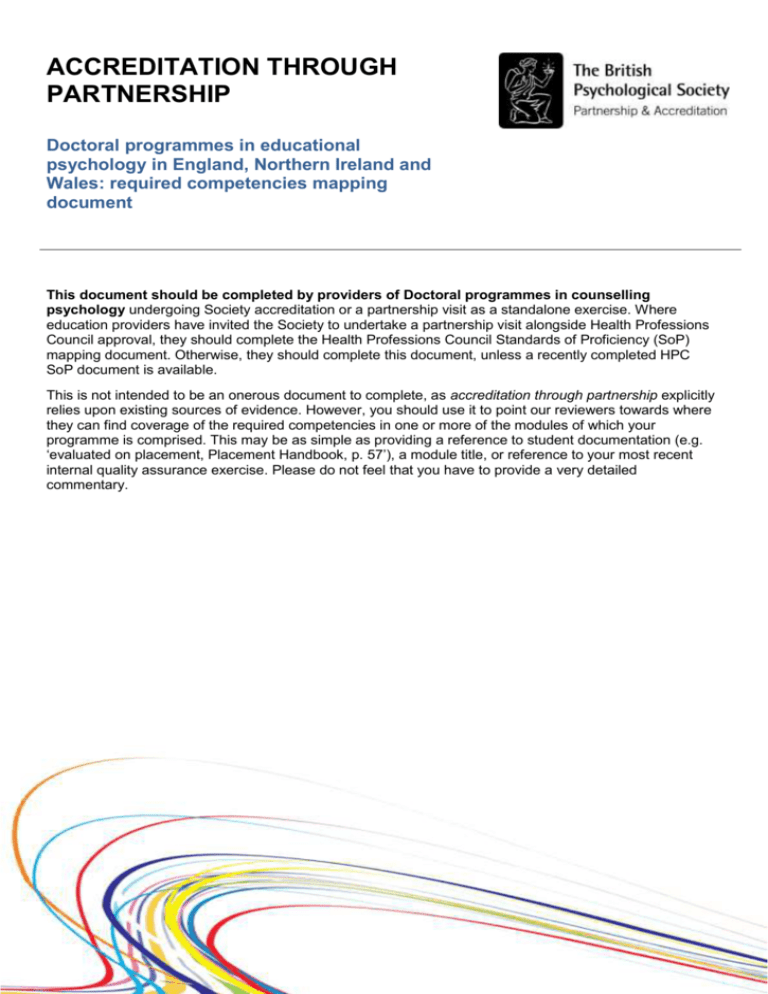
ACCREDITATION THROUGH PARTNERSHIP Doctoral programmes in educational psychology in England, Northern Ireland and Wales: required competencies mapping document This document should be completed by providers of Doctoral programmes in counselling psychology undergoing Society accreditation or a partnership visit as a standalone exercise. Where education providers have invited the Society to undertake a partnership visit alongside Health Professions Council approval, they should complete the Health Professions Council Standards of Proficiency (SoP) mapping document. Otherwise, they should complete this document, unless a recently completed HPC SoP document is available. This is not intended to be an onerous document to complete, as accreditation through partnership explicitly relies upon existing sources of evidence. However, you should use it to point our reviewers towards where they can find coverage of the required competencies in one or more of the modules of which your programme is comprised. This may be as simple as providing a reference to student documentation (e.g. ‘evaluated on placement, Placement Handbook, p. 57’), a module title, or reference to your most recent internal quality assurance exercise. Please do not feel that you have to provide a very detailed commentary. 1 Required competencies 1. Module(s)/coverage Core professional skills 1. Decide, using a broad evidence and knowledge base, how to assess, formulate, and intervene psychologically, from a range of possible models and modes of intervention. 2. Generalise and synthesise prior knowledge and experience in order to apply them in different settings and novel situations. 3. Demonstrate self-awareness and work as a reflective psychological practitioner. 4. Think critically, reflectively and evaluatively. 5. Exercise duty of care with regard to safeguarding children. 6. Develop and maintain effective working relationships with key role partners including: children, young people, their carers, teachers and other professionals. Work collaboratively, when appropriate, with the above role partners to promote effective outcomes for clients. 7. Engage children, young people and their carers as active participants in assessment and decision-making processes, and in the evaluation of interventions and service delivery. 8. Identify, critically appraise and apply research evidence relevant to practice. 9. Demonstrate effective professional management and organisational skills. 10.Effectively communicate psychological knowledge and insights. 11.Demonstrate effective interpersonal communication skills across a range of settings and activities. 12.Demonstrate effective reporting and recording skills across a range of settings and activities. 2. Practice of applied educational psychologists 1. Demonstrate practice that evolves from robust psychological models, theories and frameworks with due ethical consideration. 2. Formulate interventions that focus on applying knowledge, skills and expertise to support identified local and national initiatives. 3. Bring about change for individuals, children, young people and their families by working at different levels (e.g. individuals, families, groups, communities, organisations, local authorities and national priorities). 4. Select, use and interpret a broad range of assessment instruments with due consideration to their relevance to the client, their needs and likely interventions. 5. Apply, review and evaluate a range of professionally appropriate counselling and therapeutic skills in work with children, their families and other professionals. 6. Develop and apply practice based on evidence-based approaches, incorporating evaluation, monitoring and review of outcomes. 7. Adopt a proactive and preventative approach in order to promote the psychological wellbeing of clients. 8. Apply and adapt personal professional practice skills within differing service contexts, and to service standards. 9. Understand and apply consultancy models of service delivery. 10.Contribute a distinct psychological perspective within multi-disciplinary teams. 3. Personal and professional standards and values 2 1. Demonstrate professional and ethical practice which adheres to the British Psychological Society’s Code of Ethics and Conduct. 2. Apply knowledge of, and demonstrate the ability to operate effectively within, the legal, national and local frameworks for educational psychology practice. 3. Apply educational psychology across a variety of different contexts that draws creatively and flexibly from a range of theoretical models, frameworks and psychological paradigms. 4. Take account of the impact and implications of differences and diversity on life opportunities. 5. Engage in a dynamic, responsive and evolving process to maintain and develop professional practice through the process of appropriate professional reflection and CPD. 6. Work effectively at an appropriate level of autonomy, with awareness of the limits of own competence, and accepting accountability to relevant professional, academic and service managers. 7. Develop strategies to deal with the emotional and physical impact of practice and seek appropriate support where necessary, with due consideration for boundaries. 8. Engage in and learn from supervision. 4. Application of evaluation, research and enquiry 1. Plan and conduct rigorous research i.e. identify research questions, demonstrate an understanding of ethical issues, choose and implement appropriate methods and analysis, report outcomes and identify appropriate pathways for dissemination including publication. 2. Develop a critical understanding of the philosophy of research, including alternative epistemological positions to provide a context for theory construction 3. Develop a critical understanding of research design, including the choice of alternative techniques, the formulation of researchable questions and appropriate alternative approaches to research. 4. Develop a critical understanding of methods of data collection and analysis, including quantitative and qualitative methods and appropriate skills 5. Develop a critical understanding of specialist/advanced methods relevant to the individual’s own research. 6. Select, design and implement approaches to evaluate the effectiveness and impact of interventions, to inform evidence based practice. 7. Work with key role partners to support the design, implementation, conduct, evaluation and dissemination of research activities, and to support local authorities in conducting robust evidence based research. 3



